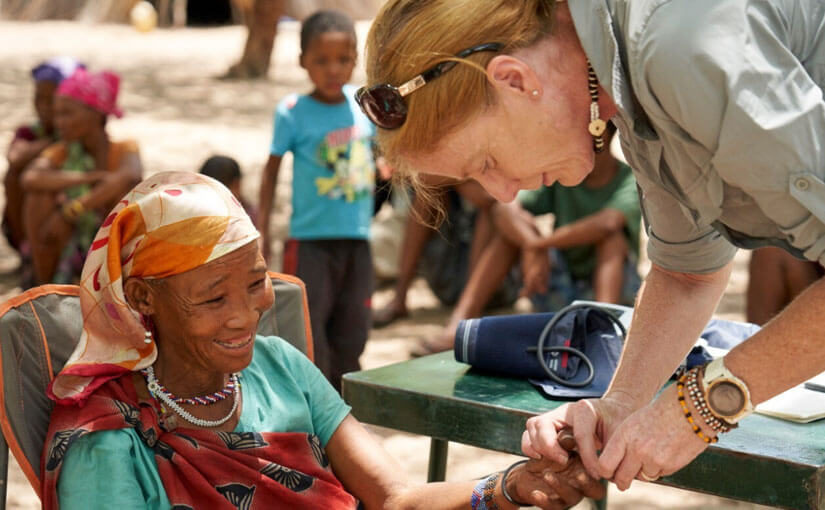Professor Vanessa Hayes’ presentation at the 2021 Australian Institute of Medical and Clinical Scientists (AIMS) National Scientific Meeting was a fascinating look into the insights she and her team from the Garvan Institute have gathered during their genome research.
The team is particularly focused on prostate cancer, the most common male cancer in Australia. The Australia and New Zealand region has the highest prostate cancer rates worldwide, making it a priority topic for researchers.
Precision medicine is an exciting field, which uses genomic data to diagnose, treat and prevent disease. Prof Hayes and her team go a step further in their work, redefining the concept as ‘precision health’ which she describes as; “The use of multi-data (including genomic data) to diagnose, treat and prevent disease.”
Prof Hayes and her team are interested not only in the genomic make-up, but other factors that impact disease risk. She notes the role of a person’s exposure history; for example, carcinogens someone could be exposed to in utero and the changes this could cause that might predispose that person to cancer in later life.
Although it is 20 years since the human genome project, Professor Hayes notes we still have a great deal to discover about human genomes. The team believes that to tackle today’s prostate cancer burden we should look to what is yet to be discovered in an area of rich genomic diversity where relatively little study has been done, Africa.
Africa is the cradle of humanity, and although there are differing schools of thought on which precise region the first modern humans came from, we know enough about the origins of humanity and the migration of early humans to know that only a handful of different genomes left the region and were disseminated around the world. Prof Hayes puts it simply; “Humans have spent way more time in Africa than we have outside Africa.”
However, of all the genomes that have been sequenced worldwide more than 78 per cent are from people of European origin, and less than 3 per cent are from people of African origin. In 2010, the Garvan Institute embarked on the first project to sequence the genomes of African people, with two participants. One was a man from a hunter gatherer community based in the Kalahari desert, the other was Bishop Desmond Tutu, a well-known activist from South Africa.
From just these two genomes 1.3 million previously unknown genetic variants were discovered. This is an excellent example of the rich diversity in African human genomes and the Garvan team have gone on to conduct more genomic research in Africa, paving the way for a deeper understanding of our human make-up.
So, what does this have to do with prostate cancer?
We know that prostate cancer has genetic components. Men with one close male relative diagnosed with prostate cancer have double the risk of developing prostate cancer themselves.
Unlike some other cancers, such as melanoma and lung cancer, that have modifiable risk factors, for example UV exposure and smoking, no modifiable risk factor has been identified for prostate cancer.
The known risk factors are age, family history and ethnicity.
In the United States, data shows that African American men have a 1.74 times greater risk of being diagnosed with prostate cancer, and are likely to be diagnosed 10 years younger than their European counterparts. African American men also face a 2.7 times greater risk of dying from the disease.
However, there have been no genomic studies in Africa looking at disparities in prostate cancer incidence and mortality. The team from the Garvan Institute and their partners in the region are changing this.
There is a much lower prostate cancer incidence but a higher mortality rate among men in Sub-Saharan Africa. The life expectancy in Sub-Saharan African men is around 20 years lower than in Australia, this challenges the perception of prostate cancer as a disease of older men and is particularly concerning.
Prof Hayes described some of the differences researchers are seeing for prostate cancers in African men: “There is an elevated tumour mutational burden, four-fold greater than would be expected. Our big question then is, at least in Africa where there is such aggressive disease, could an environmental carcinogen be contributing to prostate cancer in the region?”
The next step for a team of researchers is to look more closely at environmental factors. They have chosen the village of Vhembe in the north of South Africa on the border of Mozambique, Zimbabwe and Botswana as men in the region tend to have more aggressive prostate cancer, and at a younger age. They also believe there could be an environmental carcinogen in the region – DDT. This is a chemical used to control mosquitoes as malaria is endemic in this area.
As well as looking at the environment itself through water and soil samples, the team will analyse blood serum, urine and toenail samples for biochemical data. Combining this with genomic data they will look to establish if environmental factors could be causing genetic mutations seen in African men.
“This research open windows to understand a very common disease here in Australia,” said Professor Hayes.
This article is based on Prof Hayes excellent plenary session at the AIMS National Scientific Meeting; if you missed out on the meeting, you can still register to receive access to the presentations on demand at the event website
Image credit: Chris Bennett – University of Sydney

